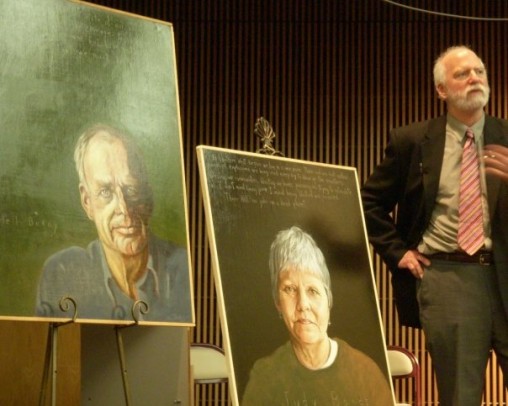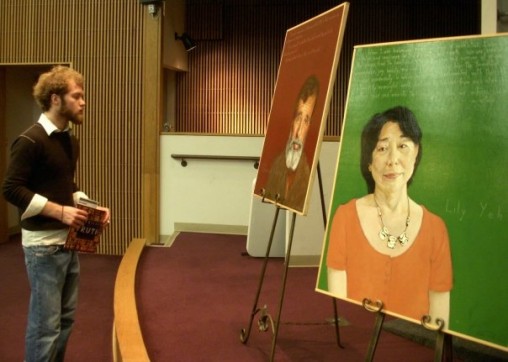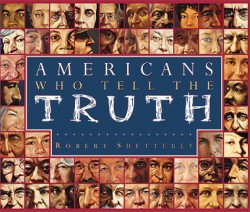2009 Rezendes Ethics Lecture
Couldn’t make it to our annual lecture?
You can view Robert Shetterly’s presentation online.
Below is an article about our 2009 Rezendes Ethics Lecture from the Bangor Daily News. This piece by Jessica Bloch appeared in the April 24, 2009 edition.
Artist defines victims of war
Collateral damage has face, identity

ORONO, Maine — Robert Shetterly has earned a national reputation in part on the basis of his portraits of Americans who have made a difference and who, according to him, have spoken the truth about an issue. Some are known around the globe. Some are national heroes. Others are local crusaders.
Shetterly, however, was more interested Wednesday afternoon in discussing his portraits of people who were unfamous and unknown — and how and why they’ve suffered during war.
Shetterly, an artist and anti-war activist, spoke about “The Ethic of Collateral Damage,” as the annual Rezendes Ethics Lecture at the Donald P. Corbett Building at the University of Maine.
Shetterly is serving this year as the John M. Rezendes Visiting Scholar in Ethics for the university’s Honors College, which sponsors the lecture.

A Brooksville resident, Shetterly has spoken around the country about “Americans Who Tell the Truth,” a book and series of 135 paintings of activists, authors, politicians and others.
He is also active in local anti-war demonstrations.
“Robert doesn’t just talk the talk,” said Doug Allen, who teaches philosophy at UM and who introduced Shetterly. “He’s an artist and he’s also an artist-activist who puts his art into practice in ways consistent with the portraits he does, the people who have inspired him.”

During his lecture, Shetterly discussed the collateral damage of war, including civilians, targeted and untargeted, who die as a result. At the same time he was painting the “Americans Who Tell the Truth” series, Shetterly said, he also was working on a series of smaller paintings he called “Collaterals.”
“One rarely sees the face or knows the identity of a collateral,” he said. “It’s a visual and abstract category in which the victim is never a real person, a kind of discarded ghost.”
Collateral damage is the result, Shetterly said, of our belief that we must be willing to inflict damage in order to preserve the inalienable rights to which we feel entitled and also to keep driving forward the market.
“It should be obvious that when a government has lied to its people about the reason for taking them to war … then you should realize that unalienable rights as a term is a smokescreen, a mass narcotic that induces denial and hypocrisy, and a term which is viciously defended not because it’s a point of truth, but because it masks a lie.”
Shetterly questioned the definition of collateral damage. If we consider the massacre of 800,000 Tutsis in Rwanda a genocide, he said, why not nearly 3 million Iraqis who have died in the war and because of sanctions as genocide victims as well?
In the end, he said, collateral damage can lead to a breakdown of nature.
“By placing economic expansion before sustainability, which is the rhythm of the earth, we become our own collateral damage …
“If we live by power, and violence and exploitation, by disrespect for other people’s lives, it will come back to haunt us. The snake will bite its own tail.”


